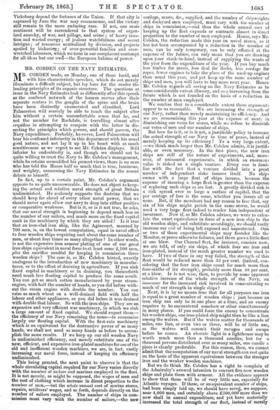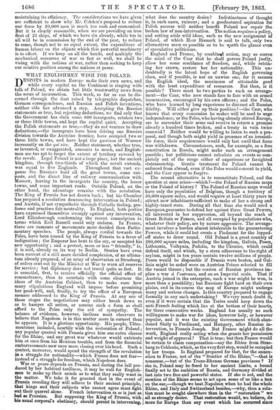MR. COBDEN ON THE NAVY ESTIMATES.
MR. COBDEN made, on Monday, one of those lucid, and with him characteristic speeches, which do not merely illuminate a difficult subject, but lay bare for the reader the leading principles of its organic structure. The questions at issue in the Navy Estimates look as differently after this speech as the confused network of the human nerves after their separate centres in the ganglia of the spine and the brain have been distinctly enumerated and classified. Lord Palmerston will scarcely be able to touch the subject after him without a certain uncomfortable sense that he, and not the member for Rochdale, is travelling almost ultra erepidana in attempting to compete with the latter in dis- secting the principles which govern, and should govern, the Navy expenditure. Probably, however, Lord Palmerston will bear his confessed inferiority in this department with his usual good nature, and not lay it up in his heart with as much sensitiveness as we regret to see Mr. Cobden displays. Still inferior he undoubtedly is, and though we should not be quite willing to trust the Navy to Mr. Cobden's management, while he retains unmodified his present views, there is no man who has told the House half so much that is true, luminous, and weighty, concerning the Navy Estimates in the recent debate as himself.
In fact, up to a certain point, Mr. Cobden's argument appears to us quite unanswerable. He does not object to keep- ing the actual and relative naval strength of great Britain undiminished. He zealously supports the doctrine that we should keep far ahead of every other naval power, that we should never again allow our navy to drop into either positive or comparative weakness. But is it, or is it not true, he asks, that our naval strength is beginning to depend much less on the number of our sailors, and much more on the fixed capital sunk in the machinery by which they are aided ? Is it true that an iron-clad iron ship, like the Agincourt, manned by 700 men, is, on the lowest computation, equal in naval effect to four wooden ships requiring each about the same number of men, or about four times as many altogether ? In other words, is not the expensive iron armour plating of one of our great iron ships equivalent in naval force to at least some 2,100 men, plus the sacrifice needful for keeping in commission three wooden ships ? The case is, as Mr. Cobden hinted, exactly analogous to the introduction of new machinery in manufac- tures. or to the effect of draining in agriculture. If you sink fixed capital in machinery or in draining, you thenceforth need much less floating capital to produce the same result. You can get as much cotton manufactured by your steam- engine, with half the number of hands, as you did before with- out the steam engine with double the number. You can raise as much wheat on a well-drained field with half the labour and other appliances, as you did before it was drained with double that labour. So with the iron ships. They are an expensive and very efficient war machinery, in which we sink a large amount of fixed capital. We should expect them— the efficiency of our Navy remaining the same—to economize largely our floating capital. With the first-rate machinery which is an equivalent for the destructive power of so many hands, we shall not need so many hands as before to accom- plish the same results. If we keep up our old wooden Navy in undiminished efficiency, and merely substitute one of the new, efficient, and expensive iron-plated machines for one of the old and inefficient wooden machines, we are, in fact, vastly increasing our naval force, instead of keeping its efficiency undiminished.
This being granted, the next point to observe is that the whole circulating capital required for our Navy varies directly with the number of sailors and marines employed in the fleet. It is not merely, as might be supposed, the wages of men and the cost of clothino.D which increase in direct proportion to the number of men,--but the whole annual cost of marine stores, repairs, artificers' wages, and so forth, depends directly on the number of sailors employed. The number of ships in com- mission must vary with the number of sailors,—tho new cordage, masts, he., supplied, and the number of shipwrights and dockyard men employed, must vary with the number of ships in commission,—and thus the whole annual cost of keeping up the fleet expands or contracts almost in direct proportion to the number of men employed. Hence, says Mr. Cobden, the reduction made this year on naval stores, as it has not been accompanied by a reduction in the number of men, can be only temporary, can be only effected at the expense of the future, can only mean that you are drawing upon your stock-in-hand, instead of supplying the wants of the year from the expenditure of the year. If you buy much less timber for masts, less deal for decks, less cordage for ropes, fewer engines to take the place of the used-up engines than usual this year, and yet keep up the same number of ships and men, you will have to buy more next year. Hence Mr. Cobden regards all saving on the Navy Estimates as to some considerable extent illusory, and as a borrowing from the future which is not founded on the basis of a reduction in the number of men employed.
We confess that to a considerable extent these arguments appear to us reasonable. We arc increasing the strength of our Navy, rather than merely maintaining its efficiency. And we are economizing this year at the expense of next, in diminishing our votes for stores, while we refuse to diminish our votes of men and our number of ships.
But how far is it, or is it not, a justifiable policy to increase the actual strength of our Navy in time of peace, instead of merely keeping up its efficiency ? To a very large extent, —we think much larger than Mr. Cobden admits, it is justifi- able, or even necessary. In the first place, the new iron ships are still of the nature of experiments, and, more- over, of uninsured experiments, in which an enormous value is risked on a single venture. Every one is fami- liar with the fact that a venture divided into a great number of independent risks insures itself. No ship- owner with a large fleet of ships insures, because the expense of insuring a large fleet is greater than the expense of replacing such ships as are lost. A greatly divided risk is a risk spread over so large a surface of capital, that the per tentage of loss is the same, whether you insure all or none. But, if the merchant had any reason to fear that, say six of his ships might perish in the same storm, he would need a very large fleet indeed to render him independent of insurance. Now if, as Mr. Cobden advises, we were to calcu- late the exact equivalence in force of a new iron ship to the old wooden ships, and substitute accordingly, we should vastly increase our risk of being left exposed and unprotected. One or two of these experimental ships may founder like the Monitor, or prove otherwise failures, and there goes a little fleet at one blow. Our Channel fleet, for instance, consists now, we are told, of only six ships, of which four are iron and iron-plated, instead of the much greater number we used to have. If two of these in any way failed, the strength of this fleet would be reduced more than 33 per cent. (indeed, con- sidering that the four iron ships count for much more than four-sixths of its strength), probably more than 40 per cent. at a blow. Is is not wise, then, to provide by some apparent relative increase of the whole strength of the Navy, an insurance for the increased risk involved in concentrating so much of our strength in single ships?
Next, it is by no means true that for all purposes one iron is equal to a great number of wooden ships ; just because an iron ship can only be in one place at a time, and an enemy requires to be encountered somehow or other simultaneously in many places. If you could force the enemy to concentrate his wooden ships, one iron-plated ship might then be like a lion among the wolves. But if the wolves scatter for thousands of miles, one lion, or even two or three, will be of little use, as the wolves will commit their ravages and escape before he comes. An electric light in a lighthouse may be worth much more than a thousand candles, but for a thousand persons distributed over as many miles, one candle a piece is clearly preferable. For this reason, then, we cannot admit that the computation of our naval strength can rest quite on the basis of the apparent equivalence between the stronger iron and the weaker wooden machines.
But we do think Mr. Cobden has a right to complain of the Admiralty's avowed intention to convert five new wooden ships and plate them with armour. All the evidence appears to show that these will be of very little use, especially for Atlantic voyages. If these, or an equivalent number of ships, had been simply laid up, we should have saved, we suppose, near 4,000 men, and certainly above .2500,000 more than we now shall in annual expenditure, and yet have materially increased the total strength of our fleet, instead of merely maintaining its efficiency. The considerations we have given are sufficient to show why Mr. Cobden's proposal to reduce our force by 20,000 men is much too rash and economical. But it is clearly reasonable, when we arc providing an iron fleet of 21 ships, of which we have six already, while ten in all will be in commission by the end of the year, to reduce to some, though not to an equal extent, the expenditure of human labour on the objects which this powerful machinery is to effect. If we keep on all the hands, and multiply the mechanical resources of war so fast as well, we shall be vieing with the nations at war, rather than seeking to keep our relative position among the nations at peace.































 Previous page
Previous page